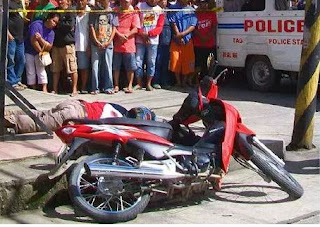The habit of killing Filipino journalists goes on
 |
| Onlookers watching a dead journalist. Photo: Inquirer.net |
In fact, the Union of Journalists of the Philippines has recorded 19 killings since President Benigno Aquino III took over the helm of power.
The latest casualty was Rogelio Butalid, 46, a block timer for 107.9 FM Radyo Natin and a host of an hour-long program "Kamatuoran" (The Truth) in Tagum City. Butalid was the third casualty in two weeks time.
According to witnesses, he just stepped out from the radio station after his radio program when a man wearing dark glasses approached him and fired several shots at him.
The other journalists killed include radioman Michael Milo in Tandag City, Surigao del Sur province; Joas Dignos of Valencia City in Bukidnon province. Another radio reporter, Jonavin "Jhey-R" Villalba, had suffered gunshot wounds when he was fired upon by an unknown assailant in front of his house in Iloilo City, Philippines.
In its website, the Committee to Protect Journalists has urged the Philippine authorities to arrest the perpetrators of Milo and swiftly bring them to justice. The Philippines ranked third on CPJ's 2013 Impunity Index, a global measure of unsolved journalist murders as a percentage of each country's population, says CPJ in a statement.
While the police are still on the manhunt for the killers of these journalists, Communications Secretary Herminio Coloma was quoted in a press conference as saying that the number of deaths was inflated and that the problem was not so serious, the CPJ stated.
But why are journalists vulnerable to killings? Is it because of their personal advocacy that they step on the toes of some influential people and politicians in their areas of coverage? However, until the perpetrators are arrested, we could only guess as to what motives the killers had in shooting their targets.
However, the manner in which the journalists were killed may have been sparked by their harsh comments on the airwaves. It could be that some corrupt public officials could be behind the plots to eliminate them completely.
Even after the uncovering of the truth behind the multi-billion pork barrel scam, which was allegedly masterminded by Janet Lim-Napoles, now locked up inside the camp of the Special Action Force of the Philippine National Police in Sta. Rosa, Laguna province, some corrupt local government officials are still around to abuse their powers while in public office.
In light of these killings, some journalists have taken extra-precaution whenever they're performing their duties outside. But without any weapon to protect himself, how could a particular journalist defend himself?
Arming themselves was frowned upon by their peers in the profession, especially those advocates of a gunless society group. But when bullets continue felling journalists who are only working for public interests, what else should be done to abate this problem?
The policemen's duty is to "serve and protect". But where were they when these killings happened? And if the journalists can't be protected, who will?


Comments